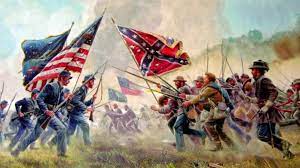What started with a wonderful Amtrak ride to Petersburg, Virginia, dinner at an English Pub with new friends, an elegant couple of nights in a beautiful and historic B&B, combined with participation in a flank march during the Civil War reenactment continued the final day of my three day stay with a personal three hour tour of some of the historic sites in a city identified through two wars, many firsts, elegant churches and so much history dating back hundreds of years. It is impossible to capture it all in a single visit.
But my personal guide, Randolph Watkins…Randy to all who know him, did his best to fill me with as much history as I could cram in about the Civil War as it was fought and won in Petersburg, Virginia.
My visit reiterated what I have long believed: it was a terrible war, did not need to be fought, and would not have been fought had the leaders of the later part of the 19th century paid more attention and respect to the leaders of the beginning of the century. Thomas Jefferson fought for states retaining their own rights in addition to a central government, and wanted states to be able to declare, own, and rule by their own rights on matters that specifically concerned them.
The North could have ended slavery in a far less killing way simply by stopping their own inhabitants from building those ships and providing those crews to sail with rum to Africa as part of the triangular trade that made them wealthy.
It was New England slave traders who purchased enslaved Africans, brought them to the West Indies and then sold them to sugarcane plantations to harvest the sugar for molasses. Those who even today portray every slave as beaten, abused, starved, and overworked show their ignorance to human nature…..a slave owner would no more damage a slave, his property he paid for, then he would a horse, cow or anything else he paid money to own. There is no doubt slavery is wrong and evil, but for thousands of slaves, it also led to a better life. That part of the story never seems to be told.
But it took a war that pitted brother against brother and took the lives of more men than any other war in which this nation has ever been involved, to end a terrible system that was always planned on the South.
The men I met on the reenactment do not advocate slavery or abuse at all. They would rather put their minds and research to learning more about their ancestors who lived and died through the Civil War; they would rather honor and respect the sacrifices they made, both at home and on the battlefield, when their homes were burned, their families starved, their lands ruined by all the battles fought on their soil.
They believe, and act with the firm belief, that remembering the most awful period of American history just may prevent us from ever facing such evil again.



